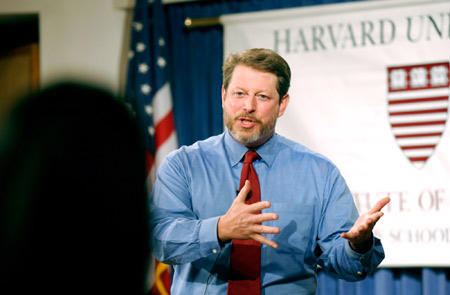Gore calls for unity
Former VP praises public servants at WTC

A relaxed, bearded Al Gore called for national unity in the wake of the Sept. 11 terrorist hijackings Thursday, praising the public servants who responded to the crisis and passing up a chance to criticize President George Bush before a packed Kennedy School crowd.
Gore delivered the 2001 Jerry Wurf Memorial Lecture Thursday evening (Oct. 4) before a crowd of about 500 in the Kennedy School of Government’s ARCO Forum. Gore praised the hundreds of public servants who gave their lives trying to save the occupants of the World Trade Center after two hijacked jetliners slammed into the buildings.
While terrorists were trying to kill innocent people, Gore said, it was firefighters and other public servants in New York City who were trying to save them.
“We should honor their memories by fighting for the values that bind us together as a country,” Gore said.
Gore started his half-hour talk by joking about his near-miss in last year’s presidential election. He first introduced himself, “I am Al Gore, I used to be the next president of the United States,” then reflected philosophically, “You win some, you lose some and then there’s that little-known third category.”
Gore’s speech was given in memory of labor leader Jerry Wurf and sponsored by the Harvard Trade Union Program, Harvard Union of Clerical and Trade Workers/AFSCME Local 3650, AFSCME Council 93, the Kennedy School’s Center for Public Leadership, Harvard College Democrats, the Harvard Political Review, the KSG Democratic Caucus, and the Institute of Politics Student Advisory Committee.
He was introduced by Harvard President Lawrence H. Summers, who served as treasury secretary during the Clinton/Gore administration. Summers provided a preview of Gore’s comments, also hailing the firefighters and other emergency personnel who headed into the World Trade Center when thousands of others were fleeing for their lives.
“There were only one group of people going up the stairs on Sept. 11. Those were public servants,” Summers said. “Anyone who wants to say that government work is wrong or that government is wrong … should think about those people going up those stairs at that moment.”
Gore drew several standing ovations from the enthusiastic crowd, largely made up of Harvard students.
“It was really inspirational. I don’t know if I was expecting that,” said Judy Gross, a master’s degree student at the Graduate School of Education. “He just seemed much more at ease here and much more what he’s probably really like.”
In his anecdote-sprinkled talk, Gore said the strength of America comes from its workers, including those public servants who are often targets when people talk about government waste and inefficiency.
“Let’s be done with attacking and criticizing them,” Gore said. “These people deserve our respect.”
During the question-and-answer session that followed his speech, Gore said he has no doubt that Osama bin Ladin is responsible for the terrorist hijackings. He also said he doesn’t understand the point of recent peace rallies, since any U.S. action is intended to stop people who are trying to kill Americans. Gore passed up several chances to criticize Bush’s handling of the crisis, praising him instead for reaching out to American Muslims and saying that the president faces hard choices.
“It is extremely difficult for President Bush to find the right path here. Whoever is in the White House would face tremendous difficulty,” Gore said. “There’s extremely difficult judgment calls that have to be made.”
Gore said Bush’s responses to those calls can certainly be debated and questioned, but after the debate is over, the nation should remain united.
“I hope … even if we disagree about other things in America, that we find a way to remain as unified as we possibly can. Because winning this war … winning this struggle against terrorism is extremely important for future generations of Americans,” Gore said.




